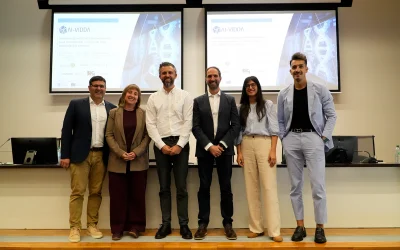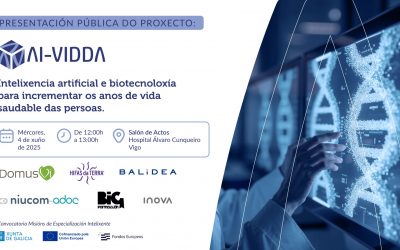We are aware that, in the coming years, interaction with the digital world in specific areas, such as health or administrative procedures, will be mainly through voice. That is why, this morning, Balidea and the AtlanTTic research center of the University of Vigo presented the FalAI project, which seeks to collect voices in Galician to improve speech recognition in our language in conversational domain assistants such as those mentioned above.
The event, which took place in the Redeiras building of the UVigo, was supported by the Mayor of Vigo, Abel Caballero, as well as the interventions of the Vice Chancellor of Communication and Institutional Relations of the UVigo, Mónica Valderrama, the CEO of Balidea, Lorenzo Rodríguez, and the researcher of AtlanTTic, Laura Docío Fernández.
Our CEO, Lorenzo Rodríguez, highlighted the importance of the proposal, which will be "an important milestone at a technological level, since there are no solutions for Galician in terms of speech technologies". For her part, Vice Rector Mónica Valderrama said that "for the university, this project is a real source of pride, as well as an example of public-private collaboration and the commitment of engineering to the language".
The mayor of Vigo, Abel Caballero, called on all the locals to participate in the project that will allow "the dialogue that we are maintaining permanently with the machines to respond in our own language and with our own accent. The researcher Laura Docío emphasized the importance of validating a methodology "that allows us to collect optimal data to improve conversational agents by voice".
This initiative is part of a collaboration between the R&D&I area of Balidea and the Multimedia Technologies Group (GTM) together with the atlanTTic research center of UVigo. The objective is to develop speech technologies that enable communication with digital devices in Galician. This collaboration is carried out through an Industrial Doctorate, framed in the Industrial Doctorate Program co-funded by GAIN and the Consellería de Cultura, Educación y Universidad.
#A30frases (#30SentencesAway)
In Galician, as in many other European languages, the necessary resources to develop this type of technology do not exist, especially in terms of voice diversity recordings. Balidea, together with AtlanTTic, was selected by the European Language Equality (ELE) initiative to contribute to linguistic equality in the digital environment in Europe.
In this context, the falAI proposal was born, with the aim of collecting examples of voices in Galician to train Artificial Intelligences in our language, and to share what has been learned with the whole of Europe. The aim is to generate datasets in Galician of conversation with virtual assistants in specific domains such as health, care or administrative procedures. It also seeks to design and validate a methodology for collecting voices and share it with society, especially with countries with minority and minoritized languages.
To give visibility to the initiative, the two entities have launched a generalized call for the contribution of voices through the platform falai.balidea.com. The hashtag #A30frases seeks the involvement of as many people as possible.
Participation in a contest just for collaborating
Participants are asked to record their voice reading thirty prototype sentences of conversation with virtual assistants indicated through the falai.balidea.com platform. Those who reach the end of the process will have the option to participate in a contest. The winner will be able to choose between three prizes: video game experience (a last generation videogame console and a visit to the Museo do Videoxogo), ICT experience (a laptop computer and a visit to the Museo do Videoxogo) and intergenerational experience (a session at the Balneario de Mondariz for the whole family and a visit to the Museo do Videoxogo).
In addition, they are asked to share the initiative with as many people as possible, also through social networks, and to help fathers, mothers, grandfathers and grandmothers so that they can also participate, as this is a priority group.
This contribution is anonymous and will be used exclusively in research projects for training artificial intelligence models in systems using speech-related technologies.
The goal is to achieve 360,000 different recordings and 300 hours of recording, a volume that is considered ideal for training a conversational assistant in a specific domain.
Technology to improve quality of life
Speech technologies will improve the communication experience of people with the digital world, especially those who, due to different circumstances, have more difficult access to it, such as the elderly or people with disabilities.
Being able to interact by voice with digital devices will open up multiple possibilities for the development of technological tools that will improve the quality of life of many people. It will serve, for example, to facilitate the care of people living alone with the creation of voice assistants, perform everyday actions through speech or even ask for help by voice in emergency situations.



